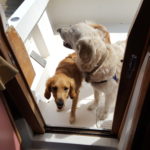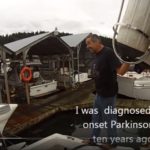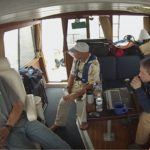My life—until recent years—mimics a pendulum’s widening arc of extremity, hinting only the slightest hesitation as the center oscillates past quiet with confounding predictability. Recognizing prior patterns of hollow value does not magically charm foibles into fables, and perception alone…
Part Three: Parkinson’s helped resuscitate my soul.
“The Lost Intruder, the Search for a Missing Navy Jet” is largely about shedding old identities, which allowed me to create fresh characteristics and behaviors based on who I wanted to be. Wiping my identity slate clean was daunting. But…
Part One: Living with Parkinson’s Disease after Deep Brain Stimulus (DBS) surgery.
Now in my 14th year since Parkinson’s Disease (PD) diagnosis at age 43, life is more vibrant than ever in physical activity and meaningful social engagement, offering up moments of rewarding personal reflection. Although not diagnosed in “old” age, it…
On report
It’s been one and a half years since the batteries implanted in my chest were turned on, and new electrical pulses began firing in both sides of my brain, ameliorating the worst of my Parkinson’s physical symptoms. It has been…
The “all of us”
Two days ago, I had four medical appointments at Swedish Hospital, the location of my Deep Brain Stimulation surgery in Seattle last November. It was beyond strange to return after two months of no visits, and I found myself fighting…
A new day
The progression of Parkinson’s is similar to the concept of “boiling a frog”: life’s natural coping mechanism—time—tends to mask the true weight of the illness from the afflicted. Now imagine if the emotional distortion of time did not exist; what…
Not Today: a 4.5 minute video
https://www.youtube.com/watch?v=_PBlzRR7ySg
When life moves fast
I was introduced to the concept of “Pretenders” and “Contenders” in 1985 by Master Gunnery Sergeant Bearup, United States Marine Corps, while attending Aviation Officer Candidate School (AOCS) in Pensacola, Florida. He had been assigned to AOCS as the Chief…
Happiness: on considering self
Some dates and annual events are particularly well suited to marking the passage of time and the accompanying growth or decay of the human spirit. There was a time when I was so anxious to believe in my self-worth that…
A bump in the road
Dawn’s patiently eager specter, Schemes sickly in brightening day, Cruel with well-honed diversion, Silently awaiting its prey, Decomposed jabs of distraction, Blunt needles plunge slowly and deep, Masking a stranger’s true nature, A shadow’s faint outline of sleep, A fluttering…





